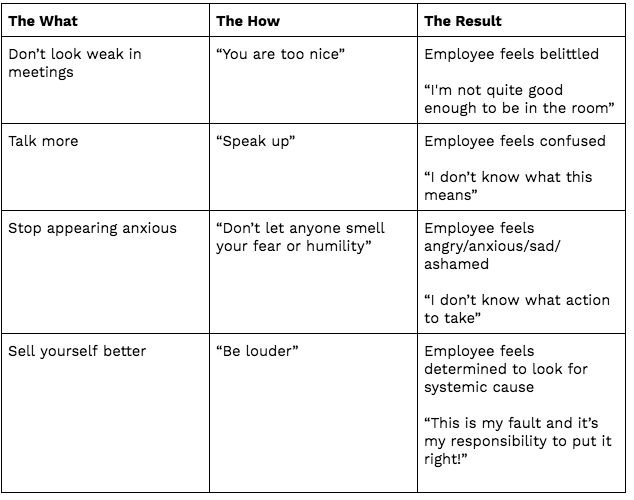Why telling your team to be more confident doesn't work
Selling and inspiring confidence in others is part of the work of leadership, and you may have to up your game if you want to play bigger.
But it’s often that confidence is so squishily defined that it ends up being an excuse to perpetuate sexism and prejudice, and it is too narrow to include all the value a person is contributing.
As the founder of #UPFRONT, an organisation dedicated to changing confidence, I’m no stranger to the complexity confidence brings to the world of work. I recognise the role external barriers play in keeping women feeling like they have low confidence. Leadership and organisational culture are top of the list. This is why this is a two-part series. This first piece is focused on leadership and culture. It’s written for anyone responsible for the performance of other people. The second piece is for those of you who’ve been told to be more confident at work.
When I asked the internet: How many of you have ever been told to be more confident at work? 37 people shared the details of their experience with me. 27 people identified as women and 5 as men. 45% were told to be more confident by someone from the same gender, 37% were told to be more confident by someone from a different gender and the rest couldn’t remember. Thank you to everyone who took the time to share their story. Here are the key patterns summarised from the data:
You may think you’re doing someone a favour by pointing out something you experience as a confidence problem but you’re probably making it worse.
For the last five years, NOBL has been levelling up organizations and teams by syncing company culture with business strategy. We coach and advise world-famous organizations like Calvin Klein, Google Deepmind, and Reddit through changes big and small. Most leaders we meet are desperate to do the right thing and help their people thrive.
Here are my top three tips for how to start talking to your team about confidence in a way that will work:
Start with the culture. What kind of culture does your organisation have? NOBL developed a tool to help you answer this question. Culture can be invisible because most of it is anchored in unspoken behaviours, mindsets, and social patterns. Leaders shape culture, through both conscious and unconscious actions (sometimes with unintended consequences). First, you have to become aware of the culture that operates in your team and your wider organisation. Then you can define an aspirational culture. When it comes to confidence, your focus should be on building an inclusive culture where everyone feels valued.
Try this: An easy way to start building an inclusive culture where everyone feels safe to contribute is to speak last in meetings. When leaders withhold their own opinion until the end of a group discussion about how to approach a problem, team members are likely to suggest a wider array of alternative solutions than if the leader had chimed in first.
Learn the rules of giving and receiving feedback. As a leader, communication is not about you, your opinions, your position or your circumstances. It is about helping your team thrive. It’s vital you understand how to use feedback as a tool that improves and empowers those you lead. A flippant or vague comment about confidence can be destabilising for many.
Try this: Give constructive feedback using the star and wish method. When you see something that needs to be addressed, simply follow the format: “I’ve noticed that…” (insert a positive observation behaviour or habit). “I wish you could bring that…” (insert an event, time, or frequency to encourage the positive attribute).
Ask questions. It’s your responsibility to understand your team's relationship with confidence the very best you can. The best way to do this is to ask questions and most importantly really listen to what you hear. You might want to ask; What prevents you from feeling confident in this team? What does confidence look like to you? Who’s confidence to you admire?
Try this: Get your team around a table and talk about the confidence and work through these questions. You might want to share your own journey through confidence and what you’ve learned along the way. No matter what your story is, the feeling and trust that comes out of role modelling curiosity will make future conversations easier to have.
Building confidence in your team is a non-stop process and it’s about culture; praise, trust, feedback and openness. What did you learn the last time you had a conversation about confidence at work? coaching people to be more confident at work?
Sign up to #UPFRONT's newsletter and NOBL's newsletter for regular doses of insight and advice on culture and confidence.

